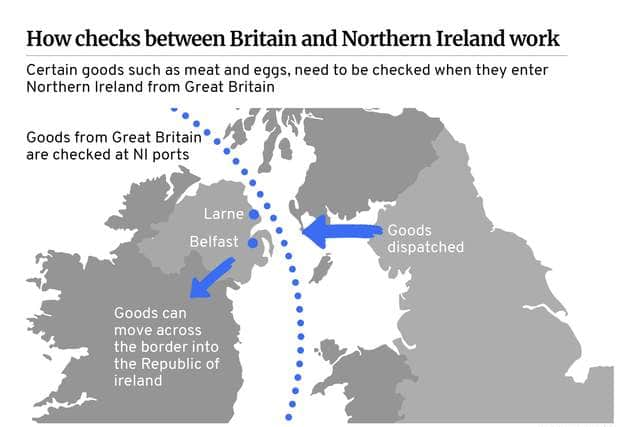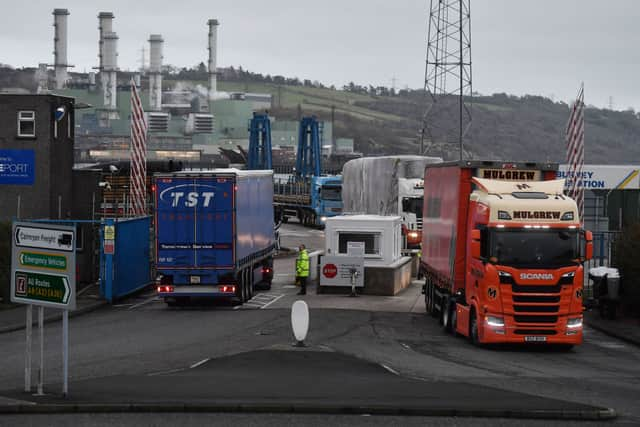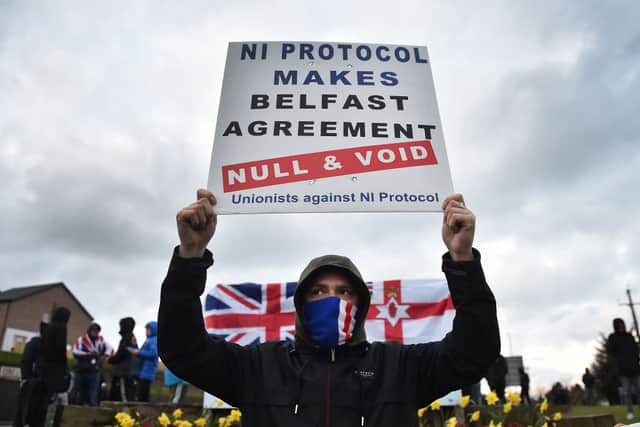What is the Northern Ireland Protocol? Post-Brexit deal explained after PM Rishi Sunak’s talks in Belfast
and live on Freeview channel 276
Rishi Sunak has said that no deal has been made yet on the Northern Ireland Protocol, admitting there is “still work to do”.
The Prime Minister arrived in Belfast on Friday (17 February) amid growing speculation that a deal could soon be struck on the the long-standing, post-Brexit impasse over the Northern Ireland Protocol. But he later said negotiations had stalled - with a Downing Street spokesperson on Monday (20 February) confirming that “no deal has been done as yet”.
Advertisement
Hide AdAdvertisement
Hide AdSunak had met with Stormont party leaders and business representatives, alongside Northern Ireland Secretary Chris Heaton-Harris, to continue talks around trading agreements post-Brexit. Afterwards, Sunak told reporters: “Today I had positive conversations with political parties in Northern Ireland about our ongoing discussions to resolve the Northern Ireland Protocol.
“Now it is clear that we need to find solutions to the practical problems that the protocol is causing families and business in Northern Ireland, as well as address the democratic deficit. There is more work to do, and that’s why my ministerial colleagues and I will continue talking to the European Union intensely to find solutions that protect the Belfast Good Friday agreement and Northern Ireland’s place in our single market.”
Speaking after one of the talks, Sinn Féin President Mary Lou McDonald was more positive - commenting that she believed a deal is “very much game on”. But a Democratic Unionist Party (DUP) MP, Sammy Wilson, has said he does not believe a deal will be struck this week, telling Sky News the UK Government had “an attitude of defeat” in its talks with the EU.
It came as reports were mounting that an agreement between the UK and the EU over the Northern Ireland Protocol was soon set to be unveiled. Sources suggested earlier this month that Britain and the European Union had finally struck a customs deal on Northern Ireland, with The Times reporting that Brussels had agreed to a proposal that would avoid the need for routine checks on products entering the country from Britain.
Advertisement
Hide AdAdvertisement
Hide AdBut in recent hours, some outlets have reported that Sunak is holding back on the deal amid concerns from the DUP and Tory Brexiteers, while others have said he will push on in spite of backlash. Essentially, the situation remains unclear.
So, what exactly is the Northern Ireland Protocol? Here’s everything you need to know about the years of disputes post-Brexit, who wants what outcome, when an agreement between the UK and EU could be struck, and much more.


What is the Northern Ireland Protocol?
In simple terms, the Northern Ireland Protocol is a trading agreement. It was negotiated during Brexit talks back in 2019, and officially came into effect in 2021.
The Protocol prevents a hard border between Northern Ireland and the Republic of Ireland. This means that goods and products can be transported across the island’s land border without the need for checks.
Advertisement
Hide AdAdvertisement
Hide AdWhy is it needed?
Before Brexit, it was easy to transport goods across the border between Northern Ireland and the Republic of Ireland because both sides were in the EU. But this ended when the UK voted to leave the EU, as the Republic of Ireland remained part of the union.
This meant that any goods transported over the border would be being moved between an EU and non-EU country, and therefore subject to EU checks. Fears arose that, due to Northern Ireland’s troubled political history, border checks could lead to renewed instability.
The UK and EU agreed that that protecting the Good Friday Agreement - or, the Northern Ireland peace deal - was an absolute priority. Therefore, both sides arranged a special trading agreement which moved the trade border to the Irish Sea, meaning checks would instead be conducted between Great Britain (England, Scotland and Wales) and Northern Ireland, at the country’s ports.


What does the UK want to change about the Northern Ireland Protocol?
The UK wants to extend the Northern Ireland Protocol to make trading between Great Britain and Northern Ireland easier too. This would be done by creating ‘green’ and ‘red’ lanes.
Advertisement
Hide AdAdvertisement
Hide AdThe green lane would be designated for trusted traders transporting goods to Northern Ireland only, and would be exempt from checks and customs controls. The red lane would be for products going on to the Republic of Ireland and the rest of the EU, which would undergo full checks and customs controls at ports.
This plan is what the UK and EU had agreed to according to The Times, but as mentioned, no announcements have been made yet. It is understood that an agreement still needs to be negotiated on exports of live animals - but that the UK is willing to maintain EU veterinary standards.
Also in relation to the Northern Ireland Protocol, The Times reported that the EU had made a major concession on the role of the European Court of Justice. For the first time, the bloc said that the ECJ could only rule on issues relating to Northern Ireland if a case had first been referred by the courts there - whereas previously, Brussels had insisted that the European Commission should be able to take cases straight to court.
A source told the newspaper: “This is a critical issue of sovereignty and that will remain with the UK. The EU has moved a lot from its original position. This deal won’t delight anyone but the hope is it satisfies everyone enough.”
Advertisement
Hide AdAdvertisement
Hide AdWho opposes the Protocol?
Unionists, who support Northern Ireland being part of the UK, are against the protocol. They argue that placing an effective border across the Irish Sea undermines Northern Ireland’s connection with the UK.
Northern Ireland’s largest unionist party, the Democratic Unionist Party (DUP), described the protocol as an “an existential threat” to the future of Northern Ireland in its manifesto. As a result of its concerns over the Protocol, the party has withdrawn from the Northern Ireland Assembly - collapsing the country’s power sharing executive and stalling politics.
Although Sinn Fein - a nationalist party that accepts the protocol - beat the DUP in the last election, held in May 2022, a new Northern Ireland government cannot be formed without the unionist party’s support.


When will a deal be announced?
Currently, there is no official word on when a deal announcement will be made. However, many have understood the Prime Minister’s trip to Northern Ireland as a sign that a deal is imminent.
Advertisement
Hide AdAdvertisement
Hide AdSources have previously indicated that Sunak wants to announce the deal when all of it it ready to sign, rather than unveiling it in parts. Others have suggested that there is a delay as the EU fears the Prime Minister will not be able to sell the package to the DUP and Tory Brexiteers.
Both the UK and EU however are reportedly keen to announce an agreement before April, which marks the 25th anniversary of the Good Friday Agreement, but will not do so unless both sides are happy. A source commented: “We only have one chance at this and the most important thing is to get it right.”
Comment Guidelines
National World encourages reader discussion on our stories. User feedback, insights and back-and-forth exchanges add a rich layer of context to reporting. Please review our Community Guidelines before commenting.
